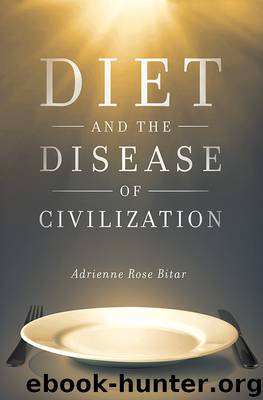Diet and the Disease of Civilization by Adrienne Rose Bitar

Author:Adrienne Rose Bitar [Неизв.]
Language: eng
Format: epub
Publisher: Rutgers University Press
FIGURE 4.1. Socialite and author Merla Zellerbach wrote one of the first detox diets in 1984. Detox combined environmentalist concerns with new concepts of food addiction. Pictured here in her home office in San Francisco. Courtesy Gary Zellerbach.
Heralding the detox movement, Zellerbach did not stress policy change or even personal consumer activism, but instead turned inward to hearth and health. She instructs readers to close their house windows on smoggy days, roll up car windows in cities, use unscented cosmetics, and, of course, keep a keen eye on their diet. Though Zellerbach did include the contact information of environmental action groups (Friends of the Earth, for example, and the U.S. Environmental Protection Agency) in an appendix, the primary focus of her book is personal. “We can live clean lives in a polluted world,” she predicts, and, for Zellerbach, detoxification is “a valid and effective answer to widespread toxic contamination.”16
Environmentalists could easily criticize this approach as a retreat—making the political so personal that the politics drain out entirely. True, Zellerbach advises her readers to eke out a clean, detoxified corner of that world for themselves and their families. Yet she refuses to accept environmental damage as irrevocable and promises that the future could look more like the past, before toxins seeped into American food and water and air and land. In a way, Zellerbach uses selfishness as a springboard, promoting a diet to rally self-concerned readers not simply to improve their own lives but to save the world. This sentiment is clearest in her last chapter:
On an individual level, we have learned how to detoxify our bodies and keep them that way. There is no doubt that we can live clean lives in a polluted world. We cannot, however, dissociate our fate from the fate of the earth. What we have learned about freeing our bodies from harmful substances must also apply to cleaning up the world. . . . By the year 2000, we should all be breathing cleaner air, eating unprocessed and uncontaminated foods, and drinking water that is fit to drink.17
Zellerbach’s Detox was also among the first few texts to broaden the addiction framework to include everyday foods like wheat, corn, eggs, or beef. Since the 1970s, food activists had likened sugar and caffeine to addictive drugs. John Yudkin’s 1972 Pure, White, and Deadly (recently reprinted with the subtitle How Sugar Is Killing Us and What We Can Do to Stop It) suggested a not-so-subtle comparison to cocaine. William Dufty’s 1975 bestseller Sugar Blues claimed that refined sugar was a lethal, addictive substance that acted much like a dangerous narcotic. Subtlety was not Dufty’s strong suit. “Heroin is nothing but a chemical,” Dufty writes, adding that “sugar is nothing but a chemical” refined into “strange white crystals.”18 Something of a pop culture sensation, Sugar Blues was promoted by none other than Gloria Swanson, Dufty’s wife at the time.19
“Food addiction” was first coined in a 1956 paper by allergist Theron Randolph, but his definition of addiction more closely resembles
Download
This site does not store any files on its server. We only index and link to content provided by other sites. Please contact the content providers to delete copyright contents if any and email us, we'll remove relevant links or contents immediately.
Cecilia; Or, Memoirs of an Heiress — Volume 1 by Fanny Burney(31378)
Cecilia; Or, Memoirs of an Heiress — Volume 3 by Fanny Burney(30974)
Cecilia; Or, Memoirs of an Heiress — Volume 2 by Fanny Burney(30924)
The Great Music City by Andrea Baker(22563)
We're Going to Need More Wine by Gabrielle Union(18112)
Bombshells: Glamour Girls of a Lifetime by Sullivan Steve(13145)
Pimp by Iceberg Slim(12977)
All the Missing Girls by Megan Miranda(12818)
Fifty Shades Freed by E L James(12480)
Talking to Strangers by Malcolm Gladwell(11959)
Norse Mythology by Gaiman Neil(11944)
Crazy Rich Asians by Kevin Kwan(8396)
Mindhunter: Inside the FBI's Elite Serial Crime Unit by John E. Douglas & Mark Olshaker(7877)
The Lost Art of Listening by Michael P. Nichols(6514)
Enlightenment Now: The Case for Reason, Science, Humanism, and Progress by Steven Pinker(6436)
Bad Blood by John Carreyrou(5802)
The Four Agreements by Don Miguel Ruiz(5552)
Weapons of Math Destruction by Cathy O'Neil(5082)
We Need to Talk by Celeste Headlee(4908)
